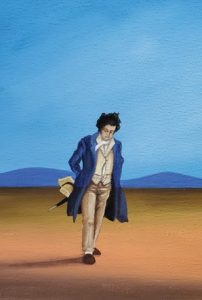The Lifesaving Power of Poetry
By Tina Hacker - Kansas City, Missouri

Solitude
By Russell Wilson
Georgetown, Ohio
Poetry saves veterans’ lives. That’s a very bold statement, but it doesn’t come from me. Rather, it comes from veterans through their writing for Veterans’ Voices. As a poetry editor for the magazine for more than 30 years, I have had an up-front seat to this. Veterans often reveal that they have considered or attempted killing themselves.
You Are Not Alone
But this stopped when they discovered an alternative: writing about the emotions and experiences that prompted their suicidal thoughts. Very often, they write poems. More important to many than the writing itself is the chance to share their feelings with other veterans, encouraging them to reconsider their actions. A vet writes, “Let me help you, you are not alone.”
We Are Left to Care for Each Other
Through writing poetry, veterans may evoke hopes and fears they have never declared before or to anyone. One vet writes, “We are left to care for each other.” This sharing is a way of unburdening emotions that have haunted them for decades. Quoting a famous axiom, a vet writes “Courage is not the absence of fear” adding, “but rather bringing your fear into submission, taming the lion within.”
Some veterans express wonder at how young they were when they were drafted. One recalls that he was called to fight, “Only 12 months before we had dates for the prom.” Others write about injuries, recovery and health. Poetry gives injured veterans the ability to walk or run without legs or arms. Poems about mental health offer veterans the chance to talk about topics they may not be comfortable discussing in person. Of course, PTSD is a problem in all the services. “Not all wounds are visible,” one vet writes.
Who Am I?
Coming home and leaving home – the transition between military life and civilian life – are major concerns. Sometimes the reunion is joyous; sometimes it’s not. A vet asks, “Who am I?”
There is much concern about commemoration with many poems about the Vietnam Wall, national cemeteries and how loved ones remember soldiers who fell. Veterans write poems about the need for the government to better recognize and honor the fallen, while other poems express appreciation for government measures to preserve the past.
We Did Not See Different Colors
The subject of race occurs frequently. Equality is often emphasized. One vet writes, “Brown, Black, Asian, Indian or White are all in this battle of survival.” Another’s poem explains, “As soldiers, we were all brothers; we did not see different colors in our skin.
Women veterans often write about topics that are unique to them. Even today, there are poems sent to Veterans Voices about sexual harassment and abuse as well as treatment not equal to that of men.
But women have the same experiences and emotions as men and repeatedly write about the importance and impact of their service. One vet writes, “Do not pigeonhole us. We are survivors.”
Poetry Plays a Healing Role
Veterans explore subjects they care deeply about such as the flag, family, freedom, spouses and sweethearts, nature and religion. But what counts most isn’t subjects. It’s the veterans themselves and how their poetry plays a healing role. It helps veterans thrive, cope, and, of upmost significance, push away thoughts of suicide.
_______________
This essay originally appeared in the weekly column, “Poetry from Daily Life” in the Springfield News Leader from Springfield, Mo. The column is produced by David L. Harrison, Poet Laureate of Missouri. All the quoted material comes from Veterans Voices.
 Tina Hacker began writing poetry in her sophomore year at the University of Illinois. This led to a career editing and writing for a major corporation. She was honored as a Muse of The Writers Place in Kansas City and is a four-time Pushcart Prize nominee. She was a finalist in New Letters and George F. Wedge competitions, won the prestigious Matrix Honor Award and was named Editor’s Choice in two literary journals. Tina is especially proud of the Clarion Award she won for her work on Veterans’ Voices. She has authored three books of poetry: Cutting It, Listening to Night Whistles, and GOLEMS. Tina is the Poetry Editor for Veterans’ Voices.
Tina Hacker began writing poetry in her sophomore year at the University of Illinois. This led to a career editing and writing for a major corporation. She was honored as a Muse of The Writers Place in Kansas City and is a four-time Pushcart Prize nominee. She was a finalist in New Letters and George F. Wedge competitions, won the prestigious Matrix Honor Award and was named Editor’s Choice in two literary journals. Tina is especially proud of the Clarion Award she won for her work on Veterans’ Voices. She has authored three books of poetry: Cutting It, Listening to Night Whistles, and GOLEMS. Tina is the Poetry Editor for Veterans’ Voices.
Posted in Writing as Therapy | From: Fall 2024

